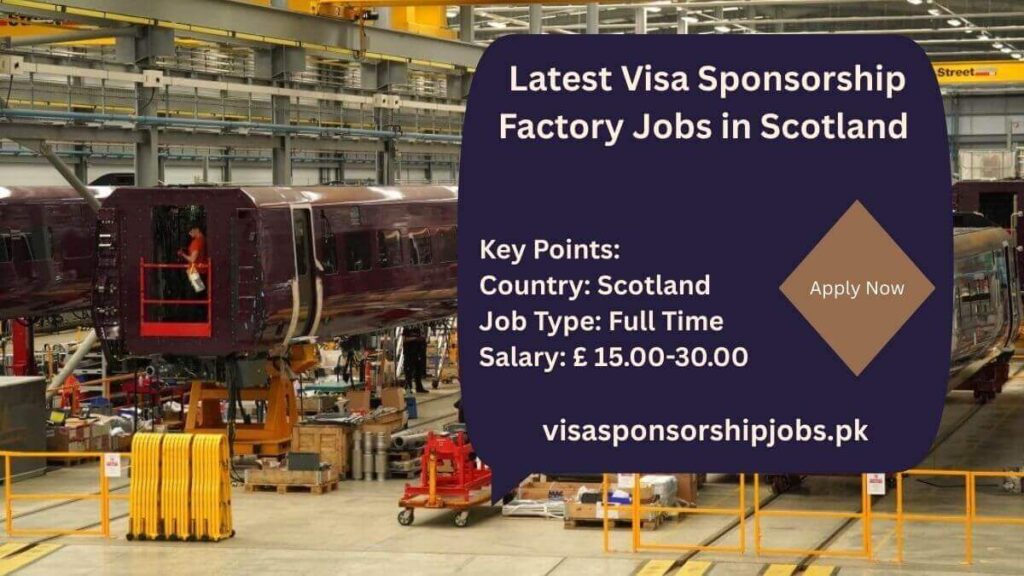Visa Sponsorship Factory Jobs in Scotland 2025
The manufacturing and production industries in Scotland are experiencing significant growth in 2025, resulting in a high demand for individuals who are dependable and diligent in factory and warehouse positions. This presents an intriguing opportunity for international candidates to reside and work in Scotland through a visa sponsorship program that is provided by approved employers.

Job Details:
- Job Title: Scotland Factory jobs
- Job Type: Full Time
- Country: Scotland
- Visa Sponsorship: Yes
Requirements:
Applicants usually want to meet certain standards to qualify for Scotland manufacturing unit visa sponsorship jobs. They may also include
- They possess pertinent academic credentials or images in the pertinent field.
- Proficiency in the English language may be necessary, contingent upon the nature of the assignment.
- Valid eligibility for a work visa or sponsorship.
- Compliance with health and safety policies.
- Capacity to paint in a collaborative setting.
- Flexibility and a readiness to acquire new abilities.
- The specific requirements may also differ based on the business enterprise and the job position.
Advantages:
Working in Scotland’s manufacturing district under visa sponsorship brings some benefits, including:
- Competitive salaries are equivalent to qualifications and satisfaction.
- Opportunities for professional and talent development.
- Health care benefits are accessible.
- A medical leave and a paid excursion.
- Cash incentives and retirement programs.
- A work environment that prioritizes diversity and inclusion, and is supportive.
- Possibility of a higher salary and incentives.
- Certain employers offer employee discounts and benefits.
- Opportunities for networking within the organization.
- Exposure to contemporary manufacturing techniques and technology.
Responsibilities:
Duties for factory jobs in Scotland can vary depending on the unique role and industry. However, unusual duties may also include
- Efficiently and exhaustively operating machines and devices.
- The assembly, inspection, and packaging of products in accordance with stringent quality standards.
- Ensuring the efficient operation of production techniques through monitoring.
- Conducting routine maintenance and resolving mechanical issues.
- Adherence to health and safety protocols to prevent accidents and incidents.
- Working collaboratively with crew members to achieve production objectives.
- Upholding the administrative center’s hygiene and personnel.
- Compliance with the organization’s policies and procedures.
- Directly communicating any issues or concerns to a supervisor.
- Consistent endeavors to enhance productivity and efficiency.
Salary
The income for factory visa sponsorship positions in Scotland can vary significantly depending on factors such as location, qualification, business, and enjoyment. Nevertheless, the average annual salary for manufacturing plant workers in Scotland ranges from £18,000 to £30,000, contingent upon the position and level of responsibility. Entry-level positions may also result in lower initial wages, although skilled workers or individuals with specialized knowledge may also command higher salaries.
Types of Jobs:
- Machine Operator: Accountable for the company’s production efficiency and high-quality output, as well as the setup of the workshop, operation of machines, and maintenance.
- Assembler: This position necessitates the use of hand tools and machinery to assemble parts or products in accordance with specific specifications.
- Quality Inspector: Conducts inspections and testing to guarantee that salient products adhere to quality standards and the established regulations, as well as to identify and rectify any deficiencies or deviations from the prescribed standards.
- Warehouse Associate: Maintains inventory, delivers and receives products, and purifies stock in organized storage areas within the factory.
- Maintenance Technician: Provides routine maintenance, repair, and troubleshooting support to machinery and equipment to prevent the waste of work hours and to ensure the seamless operation of the system.
- Production Supervisor: Oversees the daily operations of the factory floor, such as the planning of workflows, the assignment of tasks to employees, and the adherence to safety protocols and timelines.
- Packaging Specialist: A group of manufacturing professionals who are responsible for the assembly and packaging of finished consumer products in accordance with the specified specifications, as well as the labeling of items for shipment or distribution.
- Logistics Coordinator: Responsible for the coordination of production logistics, including the planning of cargo, the implementation of transportation, and the optimization of logistics efficiency.
- Safety Officer: Develops and enforces policies and procedures that mitigate workplace hazards, and fosters a culture of safety among employees.
- Engineering Technician: Provides corrective advice on engineering projects, analyzes defects and attempts to identify their origins, provides guidance on design and development processes, and assists in the resolution of equipment malfunctions that lead to manufacturing complications.
Also Check: Domestic Assistant Jobs in Scotland With Visa Sponsorship
How to Apply For Visa Sponsorship Factory Jobs in Scotland 2025?
For those who are interested in establishing a career in the manufacturing industry, the Scotland Manufacturing Unit Visa Sponsorship Jobs offer thrilling prospects. Aspiring employees can identify positions that align with their career aspirations, qualifications, and abilities by exploring the diverse range of positions available in distinctive sectors.
Frequently Asked Questions:
How many hours do you work in a factory?
Factory managers typically pressure employees to work 10 to 12-hour days, and sometimes 16 to 18-hour workdays with hours increasing as order deadlines approach. Despite government regulations, a seven-day workweek is very common during peak periods.
What does it take to work in a factory?
Most manufacturing employers require factory employees to possess a high school diploma or General Education Diploma (GED). Some aspiring factory employees take courses in high school that support their future careers, such as those in computer science and computer-assisted design (CAD) .
Is it difficult to get a job in Scotland?
There are lots of opportunities in Scotland to find a job that’s right for you, wherever you are in your career.

Leave a Reply